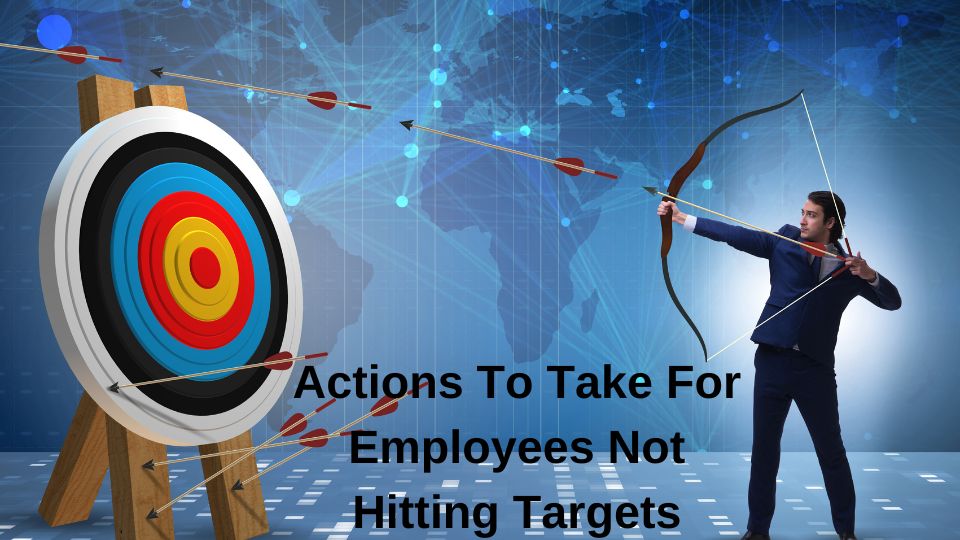Action to take for employees not hitting targets

When you have employees on your team that are not hitting targets it is frustrating and a big headache. There are lots of reasons why employees miss targets and as a manager, finding out the reasons quickly and taking the right action is good for everyone.
Doing nothing and hoping employee performance improves by itself is the worst plan. This doesn’t help you, or the employee in question and your inaction will lose the trust of the team around you.
The rest of your team will be watching your every action carefully. Taking fair reasonable action is very important for the remaining team. If you are heavy handed, the rest of the team will be thinking “when is it my turn” and motivation and trust in you will drop.
Take action and make that action fair and reasonable.
This Article Covers:
- Ask your employee what the problems are
- Assess if the targets are unrealistic
- Check the employee has the right tools and resources
- Review if the employee has the right training
- Assess if they have enough support
- Check if they are being pulled off the task or project
- Start a Personal Improvement Plan
- Take formal action
Watch on YouTube
Listen on Podcast
Taking action with employees not hitting targets is often about removing all the potential excuses they might have and gradually increasing the pressure to improve as well as increasing the support levels alongside this.
Ask them what the problems are – The First Action to take for employees not hitting targets
Asking the team member is a great starting point. Be up front and say you are worried that they are not hitting targets and you want to understand what is causing this.
Approach the conversation from the angle that you want to help them – i.e. be supportive. Manage your body language and tone of voice carefully so you don’t come across in an accusatory checking up on them manner – which will limit what you find out.
The range of replies can be huge – from a list of lame excuses to highlighting real problems that you were not aware of or didn’t fully understand the impact on the employee.
These will be times that the employee is not able to articulate any good reasons. Try not make judgements at this point – sometimes they just don’t know or are not brave enough to tell you directly.
Asking the employee should point you in the direction of the problems causing the employee to miss targets.
Assess if the targets are unrealistic – the second action to take for employees missing targets
Do take a proper look at the targets and the circumstances the employee is in.
If they are one of several team members with the same targets and the other employees are ahead of target, then this check will be quick.
If they are the only person with the targets, break the target down into the assumptions made when setting the target. Compare these assumptions to what has actually happened. Are the assumptions about right or way off? Taking this approach gives you a much less subjective approach to assessing if the target is unrealistic.
If the targets are unrealistic, reset the target using the more accurate assumptions. If the targets are realistic, move on to check other reasons for employees not hitting targets.
Check the employee has the right tools and resources – The third action to take
If the employee is being asked to hit targets but has limited budget, or limited access to the right people or information, then it is not surprising they are falling behind.
Examples of resources include
- Time
- Skills & Knowledge
- Budget
- Manpower
- System Access
- Data and insights
If a lack of tools or resources is an issue, do what you can to fix this as quickly as possible
Review if the employee has the right training – the fourth action to take for employees not hitting targets
“I have not had enough training” is almost a standard excuse you hear from many employees who are not hitting their targets. Most of the time training is not the issue. Sometimes training is the issue so do carefully check to see if they have been trained at least as well as other people doing the same or similar roles.
If training might be the issue and can be undertaken – by you or another trusted team member – then providing the training again is a sensible option. Not everyone learns in the same way or at the same speed so re-training can genuinely help and sends a positive message to the team member.
If training is definitely not the issue, then explain why you think training is not the issue to employees missing targets and see what they say. E.g. you have received the same training as the other three team members who are hitting their targets. Can you be more specific in explaining why you think lack training is an issue for you.
This approach will often stop further un-necessary training requests.
Assess if they have enough support
An action I often take with those struggling to hit targets is to book in extra one-on-one meetings and provide mentoring support. Or ask a trusted team members to do this.
Providing additional support is a great way to really understand exactly what support they need and what the underlying reasons are for not hitting targets. Getting extra help is nearly always well received by a team member.
You might not be the best person to provide support if specialist skills or experience would be useful. Work out with the employee who would be best to support them and get the support in place.
This is a good step to take as you will find out a lot more and you remove a potential excuse.
Check if they are not being pulled off the task or project – the fifth action to take for employees not hitting targets
As manager, you should be aware of what your team members are working on. I always ask the employee if they have conflicting goals, of if they are helping others out which is taking up a lot of their time, or doing additional tasks etc.
I have seen employees being pulled from pillar to post, with urgent requests and changing goals. Make sure your employee has reasonable conditions in which to hit their targets and you are protecting them enough so they can hit their targets.
Basically make sure they are not being prevented from hitting targets through workload issues.
Seveth Action to take for employees not hitting targets: Start a Personal Improvement Plan
Take this step when you have gone through the previous checks and actions. A personal improvement plan or PIP is first and foremost about providing structured support and helping to the individual. Your primary goal is improving their performance and help them to hit their targets.
Work out where they are today and where they need to get to so they can hit their targets. Break this gap down into activities and mini projects. Take the employee through how they can improve their performance in each of the areas identified and what good looks like.
Once agreed with the employee, document each element
- Where they are now
- Where they need to get to
- How they should improve
Add in milestones to the plan. Then book in weekly one-on-one sessions with the employee to mentor and coach them. Also book in monthly review meeting to check performance improvements. I normally run PIPs over 3 months which gives a reasonable timeframe for the employee to improve, without being too long if they don’t.
Eighth Action to take for employees not hitting targets: Take formal action
If you have removed all the potential barriers preventing the employee hitting targets and you have started or completed a 3 month PIP and you are not seeing any or enough improvement, then I suggest you take formal action.
This might be moving the PIP into a more formal process – for instance including HR in each review meeting and highlighting the consequences of not improving.
Or you might move straight into a formal disciplinary process. You should definitely consult with your HR department on this process and make sure you comply with company policy and all your legal requirements.
In my experience, 4 out of 5 times, taking a supportive approach while making expectations clear, will result in the employee improving their performance. After all, most employees want to do a good job.
In the remaining cases, just the action of setting out expectations clearly and then taking action against those expectations signals to any difficult employees that their behaviour or actions are not acceptable, and you will be on their case. Most of the time, they chose to move jobs, seeking an easier life or manager to deal with. In a few cases, you will go through disciplinary processes to remove employees not hitting targets from your team.
Make your actions about support first and foremost and don’t let team members off the hook.
Good luck improving your employee’s performance.
In Summary
You are in the spotlight at all times as a manager. Make sure you treat your employees fairly and offer support without letting poor work or behaviour continue. This balanced approach sends a very positive message to the other team members.
Learning how to assess employees not hitting their targets quickly and fairly and taking the right action reinforces to the team the expectations you have set in a positive way.






